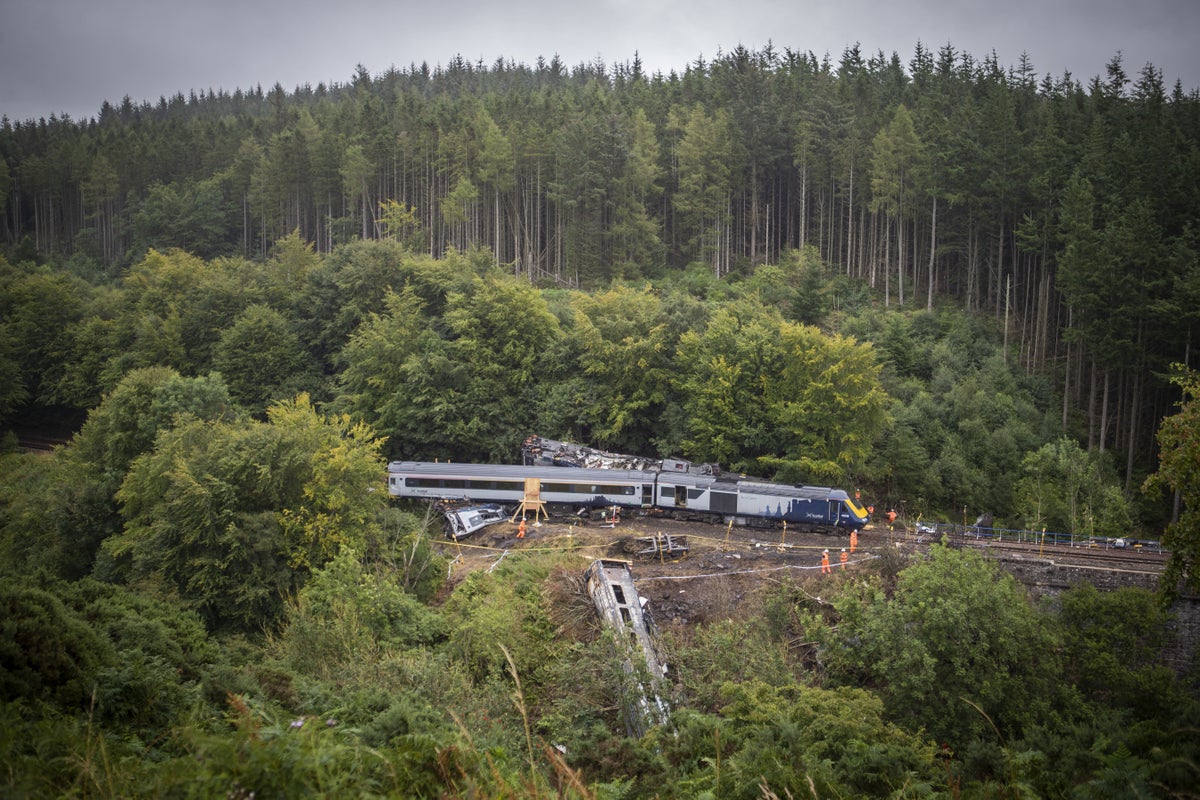
Network Rail has been fined £6.7 million after admitting health and safety failings over a rail crash that claimed three lives.
Train driver Brett McCullough, 45, conductor Donald Dinnie, 58, and passenger Christopher Stuchbury, 62, died in the derailment near Stonehaven, Aberdeenshire, on August 12, 2020.
At the High Court in Aberdeen on Thursday, the company admitted a series of failings that resulted in the deaths, pleading guilty to a charge covering the period from May 1, 2011 to August 12, 2020.
This included failing to inform the driver that it was unsafe to drive the train at a speed of 75mph, or caution him to reduce his speed amid bad weather on the day of the derailment, which also left six people injured.
Sentencing Network Rail on Friday, Judge Lord Matthews said: “Very few people in the north east of Scotland will ever forget the images of the carriages at Carmont (Stonehaven).
“No penalty I can impose will come close to compensating those whose lives have been touched by this tragedy.
“The only disposal I have is a fine.”
Lord Matthews told the court he had to take many factors into consideration when giving a fine, such as the company’s ability to run the public service.
He added: “Is culpability high? Yes it was.”
The judge said a fine would have been set at £10 million but was reduced due to the early plea of guilty as well as Network Rail’s actions following the crash.
He also reduced the fine due to Network Rail being a publicly-funded body.
Network Rail admitted there were failings in construction, inspection and maintenance of drainage assets and in adverse and extreme weather planning.
It admitted it failed to ensure, so far as was reasonably practical, that railway workers not in its employment and members of the public travelling by train were not exposed to the “risk of serious injury and death from train derailment” as a result of failures in the construction, inspection and maintenance of drainage assets and in adverse and extreme weather planning.
In his submission, Network Rail’s lawyer Peter Gray KC told the court: “The tragic events of August 12, 2020 shook Network Rail to its core.
“On behalf of Network Rail, I offer the deepest and most profound sympathies to the families. And to the injured, the deepest and heartfelt regret.
Mr Gray said the three men died in “the most appalling and tragic circumstances”.
He added: “Its acceptance of its shortcomings was both immediate and genuine.
“Its co-operation with all investigations was absolute. And its response to ensure so far as reasonably possible that such tragedy should not be repeated was comprehensive and continues.”
He added that the guilty plea had avoided the need for a potentially distressing, lengthy and complex trial.
Advocate depute Alex Prentice KC, prosecuting, told the court on Thursday that Network Rail had failed to maintain or inspect a drainage asset built in 2011 prior to the derailment.
He said if the drain had been constructed to the agreed specifications, it would have been able to cope with the amount of washout of gravel which resulted in the train derailing.
The court also heard Mr McCullough had asked the Carmont area signaller if there were any speed restrictions in place due to the conditions.
The signaller told him: “Eh no, everything’s fine between myself and Stonehaven.”
The court heard that when Mr McCullough pulled the emergency brake, there was “insufficient time” for it to have any impact on the train’s speed.
A Rail Accident Investigation Branch (RAIB) report published last March found errors in the construction of a drainage system installed by Carillion meant it was unable to cope with heavy rain which fell in the area on the morning of the crash.
Carillion went into compulsory liquidation in January 2018.
Mr Gray told the court on Friday that Network Rail runs one of the “safest railways in Europe”, and the drainage construction project at Carmont had been “very straightforward”, which it believed negated the need for a handover meeting at the time with Carillion.
The RAIB report made 20 recommendations to improve railway safety, many of which were directed at Network Rail.
Network Rail said it is determined to build upon the “significant changes” it has made since the incident, which have “helped us to manage the risk of severe weather to the network”, and it has invested millions to improve the resilience of the railway.







